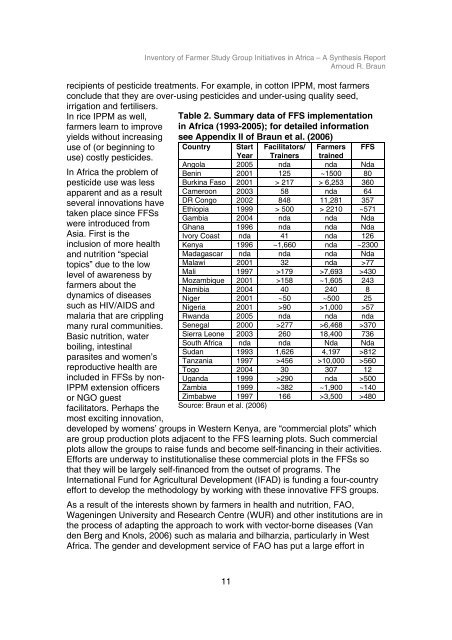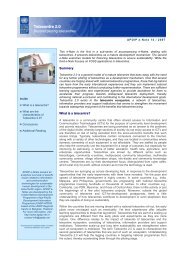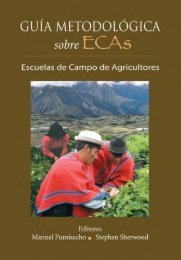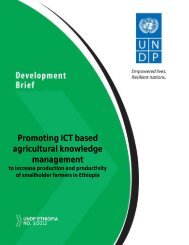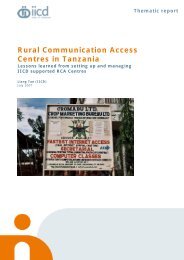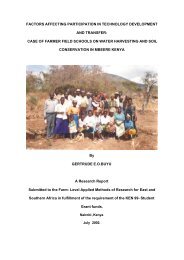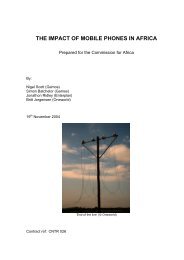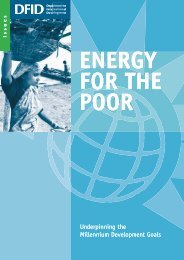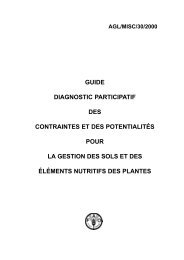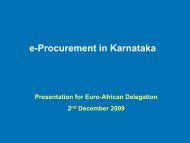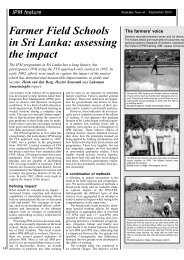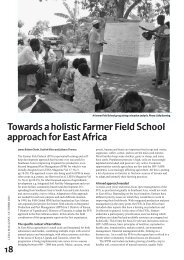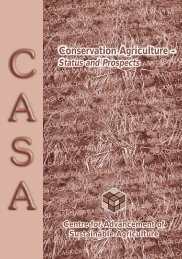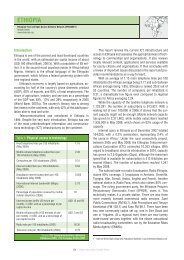inventory of farmer study group initiatives in africa - Share4Dev.info
inventory of farmer study group initiatives in africa - Share4Dev.info
inventory of farmer study group initiatives in africa - Share4Dev.info
You also want an ePaper? Increase the reach of your titles
YUMPU automatically turns print PDFs into web optimized ePapers that Google loves.
Inventory <strong>of</strong> Farmer Study Group Initiatives <strong>in</strong> Africa – A Synthesis Report<br />
Arnoud R. Braun<br />
recipients <strong>of</strong> pesticide treatments. For example, <strong>in</strong> cotton IPPM, most <strong>farmer</strong>s<br />
conclude that they are over-us<strong>in</strong>g pesticides and under-us<strong>in</strong>g quality seed,<br />
irrigation and fertilisers.<br />
In rice IPPM as well,<br />
<strong>farmer</strong>s learn to improve<br />
yields without <strong>in</strong>creas<strong>in</strong>g<br />
use <strong>of</strong> (or beg<strong>in</strong>n<strong>in</strong>g to<br />
use) costly pesticides.<br />
In Africa the problem <strong>of</strong><br />
pesticide use was less<br />
apparent and as a result<br />
several <strong>in</strong>novations have<br />
taken place s<strong>in</strong>ce FFSs<br />
were <strong>in</strong>troduced from<br />
Asia. First is the<br />
<strong>in</strong>clusion <strong>of</strong> more health<br />
and nutrition “special<br />
topics” due to the low<br />
level <strong>of</strong> awareness by<br />
<strong>farmer</strong>s about the<br />
dynamics <strong>of</strong> diseases<br />
such as HIV/AIDS and<br />
malaria that are crippl<strong>in</strong>g<br />
many rural communities.<br />
Basic nutrition, water<br />
boil<strong>in</strong>g, <strong>in</strong>test<strong>in</strong>al<br />
parasites and women’s<br />
reproductive health are<br />
<strong>in</strong>cluded <strong>in</strong> FFSs by non-<br />
IPPM extension <strong>of</strong>ficers<br />
or NGO guest<br />
facilitators. Perhaps the<br />
most excit<strong>in</strong>g <strong>in</strong>novation,<br />
Table 2. Summary data <strong>of</strong> FFS implementation<br />
<strong>in</strong> Africa (1993-2005); for detailed <strong>in</strong>formation<br />
see Appendix II <strong>of</strong> Braun et al. (2006)<br />
Country Start Facilitators/ Farmers FFS<br />
Year Tra<strong>in</strong>ers tra<strong>in</strong>ed<br />
Angola 2005 nda nda Nda<br />
Ben<strong>in</strong> 2001 125 ~1500 80<br />
Burk<strong>in</strong>a Faso 2001 > 217 > 6,253 360<br />
Cameroon 2003 58 nda 64<br />
DR Congo 2002 848 11,281 357<br />
Ethiopia 1999 > 500 > 2210 ~571<br />
Gambia 2004 nda nda Nda<br />
Ghana 1996 nda nda Nda<br />
Ivory Coast nda 41 nda 126<br />
Kenya 1996 ~1,660 nda ~2300<br />
Madagascar nda nda nda Nda<br />
Malawi 2001 32 nda >77<br />
Mali 1997 >179 >7,693 >430<br />
Mozambique 2001 >158 ~1,605 243<br />
Namibia 2004 40 240 8<br />
Niger 2001 ~50 ~500 25<br />
Nigeria 2001 >90 >1,000 >57<br />
Rwanda 2005 nda nda nda<br />
Senegal 2000 >277 >6,468 >370<br />
Sierra Leone 2003 260 18,400 736<br />
South Africa nda nda Nda Nda<br />
Sudan 1993 1,626 4,197 >812<br />
Tanzania 1997 >456 >10,000 >560<br />
Togo 2004 30 307 12<br />
Uganda 1999 >290 nda >500<br />
Zambia 1999 ~382 ~1,900 ~140<br />
Zimbabwe 1997 166 >3,500 >480<br />
Source: Braun et al. (2006)<br />
developed by womens’ <strong>group</strong>s <strong>in</strong> Western Kenya, are “commercial plots” which<br />
are <strong>group</strong> production plots adjacent to the FFS learn<strong>in</strong>g plots. Such commercial<br />
plots allow the <strong>group</strong>s to raise funds and become self-f<strong>in</strong>anc<strong>in</strong>g <strong>in</strong> their activities.<br />
Efforts are underway to <strong>in</strong>stitutionalise these commercial plots <strong>in</strong> the FFSs so<br />
that they will be largely self-f<strong>in</strong>anced from the outset <strong>of</strong> programs. The<br />
International Fund for Agricultural Development (IFAD) is fund<strong>in</strong>g a four-country<br />
effort to develop the methodology by work<strong>in</strong>g with these <strong>in</strong>novative FFS <strong>group</strong>s.<br />
As a result <strong>of</strong> the <strong>in</strong>terests shown by <strong>farmer</strong>s <strong>in</strong> health and nutrition, FAO,<br />
Wagen<strong>in</strong>gen University and Research Centre (WUR) and other <strong>in</strong>stitutions are <strong>in</strong><br />
the process <strong>of</strong> adapt<strong>in</strong>g the approach to work with vector-borne diseases (Van<br />
den Berg and Knols, 2006) such as malaria and bilharzia, particularly <strong>in</strong> West<br />
Africa. The gender and development service <strong>of</strong> FAO has put a large effort <strong>in</strong><br />
11


